Foods High In Vitamin D – 13 Quickest & Natural Ways To Boost Vitamin D!
Do you know that dark-skinned people are more likely to develop the deficiency of Vitamin D? This is because of more amount of melanin in their body which does not absorb U.V radiation & as you know sunlight is a great source of vitamin D. Being obese, ageing, Chron’s disease, celiac disease are some other causes. Here are the top 13 foods high in vitamin D to reduce the risk of deficiency & Impart other health benefits.
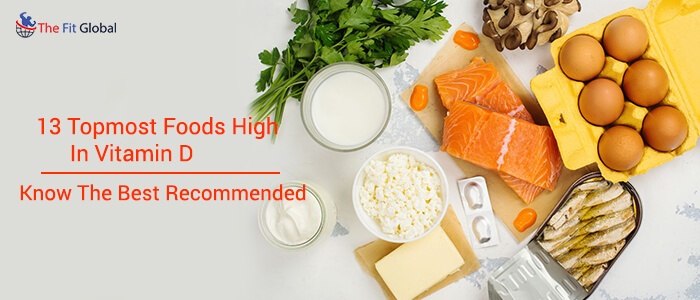
What Is The Daily Recommended Intake Of Vitamin D?
Various food sources provide vitamin D and the quantity they provide varies from one food to another. The recommended intake of vitamin D is 25 to 100 micrograms per day for a healthy adult.
However, we cannot restrict the intake to a certain value since there are various factors which determine how much vitamin D is needed on a daily basis.
So, it is always better to be aware of how much vitamin D should be present in our blood.
A quantity of 20 Nanograms/millilitre to 50 Nanograms/millilitre is considered as safe whereas a level less than 12 Nanograms/millilitre indicates the deficiency.
Foods High In Vitamin D – How To Increase Vitamin D Levels Quickly?
Getting exposed to the sun is the best and natural way of procuring vitamin D but here is the best way to increase vitamin D levels with the help of some best foods.
1. Egg Yolks
(1 cup raw and fresh egg yolk weighing 243 grams fulfils 65% of daily vitamin D requirement)

Starting the day with eggs as your breakfast food is the best way to nourish your body with ample amounts of vitamin D.
Egg yolks, in particular, are known to impart 260 International units (IU) of vitamin D with 65% RDA. However, you may not obtain the same amount of vitamin D if the eggs are boiled or cooked.1
If you absolutely hate consuming egg yolks in their raw form, you can blend them into your smoothies to obtain the same benefits.
Egg yolks not only synthesize vitamin D in your body but also help in the proper development of the brain because of the presence of choline and they can also eliminate bad cholesterol (LDL) from your body. 2
Rich amounts of folate in egg yolks benefits pregnant women & prevents the chances of neurological birth defects.
2. Milk
(1 cup of whole milk weighing around 244 grams fulfils 24% of daily vitamin D requirement)

A warm cup of milk before bedtime or early in the morning can do some amazing benefits to your overall health.
In countries where there is not enough sunlight during the day, relying on natural food sources like that of milk is the best dietary option.
Drinking as much as 3 cups of warm milk throughout the day provides more than 50% of daily vitamin D requirement.
Also, vitamin D deficiency increases the risk of cardiovascular diseases and cancers and studies have to say that regular consumption of milk is known to combat the risk of both chronic disorders.3
Milk can also keep your weight in control since it is a rich source of proteins which keeps your appetite full.
However, people who are intolerant towards lactose may experience certain side effects like abdominal cramps, bloating and diarrhoea because of their inability to digest the major carbohydrate called lactose, present in dairy products.
You can skip the milk and choose the next best option if you are lactose intolerant.
3. Cheese
(One cup of diced cheese weighing around 132 grams fulfils 4% of daily vitamin D requirement)

Health professionals have to say that although cheese provides vitamin D in little amounts, it is one of the important inclusions especially if you are a vegan. 4
Moreover, cheese is delicious and can be easily included in your diet. You just have to grate the delicacy and use the shredded cheese to top your favourite recipes.
You can also dice the cheese and add them into your cuisines. It is important to know that there are various varieties of cheese and not all types provide equal quantities of vitamin D.
It is the cheddar variety of cheese with 4% RDA which is also a great source of proteins, vitamin A, vitamin B12, riboflavin, calcium, phosphorous, sodium, zinc, and selenium.
Regular consumption of cheese is known to decrease the risk of type-2 diabetes, increase bone strength, help in weight loss and also reduce the blood pressure. 5
However, excessive cheese consumption can have a negative impact which is why it is recommended to limit the consumption to an ounce (28 grams) of cheese per day.
4. Butter
(One cup of butter weighing around 227 grams fulfils 32% of daily vitamin D requirement)

Butter is definitely a good supplier of vitamin D but the dairy product is also high in saturated fats which are a kind of unhealthy fast responsible for increasing the levels of bad cholesterol.
So, regular consumption of butter is not definitely recommended. Instead, you could spread your bread with butter or use little quantities of butter to top your favourite soups and dishes.
Moderate consumption of butter apart from providing vitamin D eliminates the risk of cardiovascular diseases and diabetes. 6
If you are already obese or have high amounts of cholesterols in your blood, butter should never be your choice.
You can totally avoid butter and opt for other best source of vitamin D mentioned in the article.
5. Fish Oil
(one cup of fish oil weighing around 218 grams fulfils more than 100% of daily vitamin D requirement)
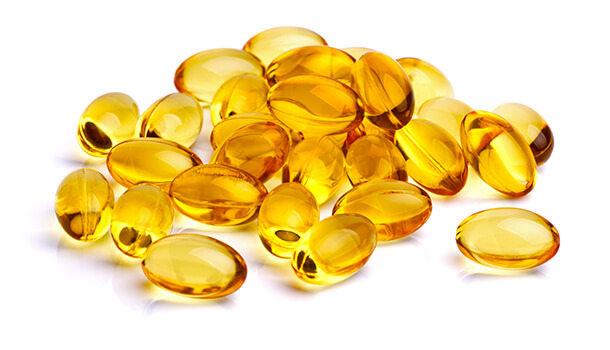
Fish oil imparts numerous benefits which is why the oil has gained commercial popularity worldwide. You can obtain similar health benefits if you consume fishes but for those who dislike consuming fish, fish oil is the best option.
Fish oil is also the richest source of healthy fats like omega-3 fatty acids and omega-6 fatty acids.
Consuming one cup of fish oils helps you meet more than 100% of daily vitamin A requirement.
Fish oils are known to protect heart health, assist in weight loss, reduce blood pressure, reduce inflammation, support mental health and improve bone strength.
Furthermore, research says that you can also reduce the signs of ageing and obtain longevity benefits with fish oil. 7
The recommended intake of fish oil per day is 2000-3000 mg for adults. 8
6. Sardines
(One cup of drained sardine weighing around 149 grams provides 101% RDA of vitamin D)

If you are a meat eater, you can enjoy the best benefits of sardines while simultaneously relishing a delicious taste of sardine.
Sardines are the richest source of almost every nutrient that our body requires for healthy functioning.
With sardines, you get plenty of calcium, Iron, magnesium, phosphorous, potassium, sodium, zinc, copper, selenium, niacin, riboflavin, vitamin B12, and vitamin E.
With regular consumption of sardines, you can improve your immunity, acquire healthy skin, improve your bone strength, prevent eye disorders and improve your insulin resistance.
7.Herrings
(One ounce of boneless herring weighing around 28 grams provides 115% of daily vitamin D requirement)
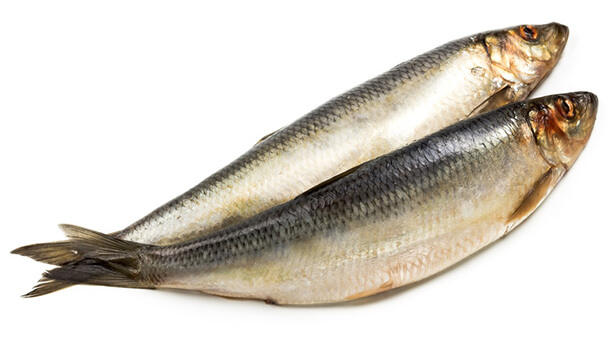
Apart from being a rich source of vitamin D, herrings also provide healthy fats in abundance. Herrings can reduce the risk of heart diseases, decrease hypertension and reduce the risk of sudden death. 9
The proteins present in herrings help in boosting collagen which benefits your overall bone health and skin health.
Herrings are also low in calories which does not cause a weight gain.
8. Caviar
(One ounce of caviars weighing around 28 grams fulfil 16% of daily vitamin D requirement)
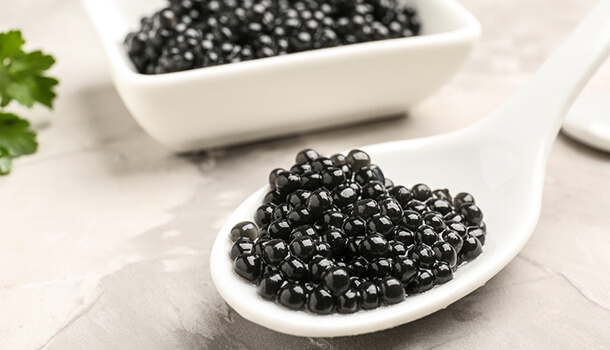
It might sound gross but caviar is actually the eggs of the species sturgeon. What makes people consume caviars still is its amazing health benefits.
Moreover, these are one of the finest suppliers of vitamin D with just an ounce fulfilling 16% of vitamin D requirement. They are usually salted to preserve the freshness.
Caviars are an excellent source of vitamin B12 and a good source of riboflavin, pantothenic acid, iron, magnesium, phosphorous, sodium, and selenium.
They also enrich your body with good amounts of omega-3 and omega-6 fatty acids which are essential for a healthy function of heart and brain. 10
If you reside in a region that does not receive sunlight for most of the year, you might have to definitely consider fish sources like that of caviar to provide your body with enough of vitamin D.
9. Mushrooms
(One cup of mushrooms weighing around 96 grams fulfil 4% of your daily vitamin D requirement)

Mushrooms are usually grown in closed environmental conditions but you can make them the best source of vitamin D if you choose to grow them in sunlight.11
Apart from vitamin D, mushrooms are also a good source of riboflavin, niacin, selenium, pantothenic acid and copper which impart a wide range of health benefits.
Mushrooms are best known for their cancer-fighting properties, weight loss property, ability to increase lifespan, improving digestion and improving longevity.
They are also known to regulate blood pressure, reduce blood cholesterol, thereby benefiting diabetics and protecting heart health. 12
10. Fortified Orange Juice
(One cup of fortified orange juice weighing around 249 grams fulfils 35% of daily vitamin D requirement)
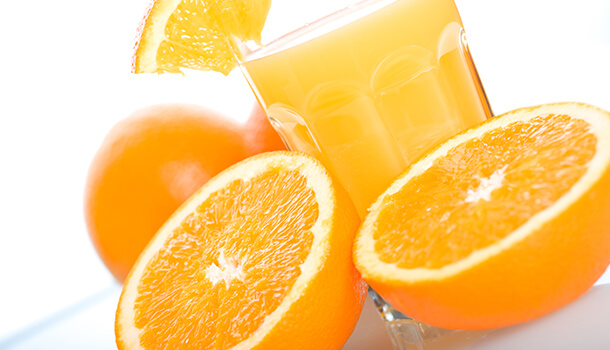
Fortification is the process of enriching the number of micronutrients in a particular food so as to obtain the maximum health benefits.
You can buy fortified orange juice online but you may have to cross check with the reviews of the product to know its authenticity.
You may also buy fortified orange juice from your nearby grocery stores but only after cross-checking with the nutritional label of the tin to know the exact amount of vitamin D that it offers,
For those who are strict vegetarians and those who avoid dairy products, fortified orange juice would be the best source of vitamin D. 13
11. Fortified soymilk
(One cup of fortified soymilk weighing around 249 grams fulfils 26% of daily vitamin D requirement)
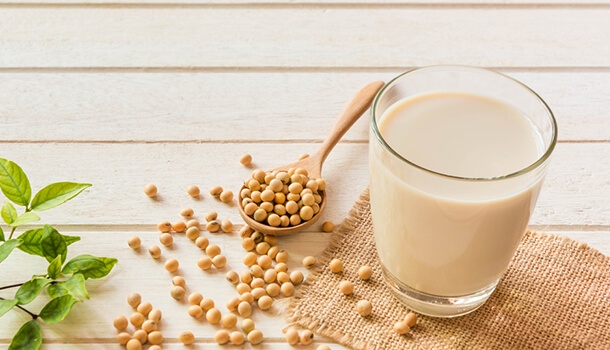
It is surprising to know that fortified soymilk is much healthier than regular cow milk for toddlers. Infants usually require milk that is rich in proteins, fats, calcium, vitamin D and vitamin B12 to gain the maximum benefits
The best benefit of fortified soymilk is that it is an excellent supplier of calcium, proteins and vitamin A, all of which are required for healthy functioning.
Also, soymilk is lactose-free and is much nutritional than cow’s milk which benefits those who are lactose intolerant and those are strict vegans.
12. Fortified Cereals
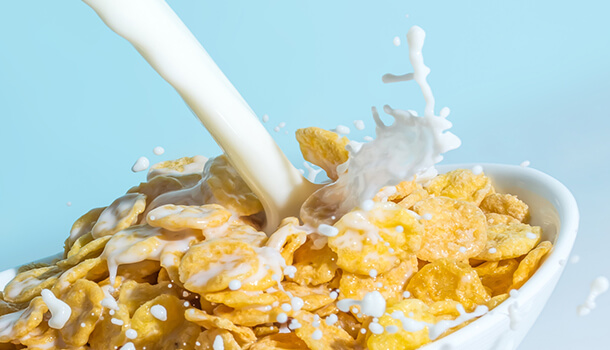
The next time you visit a grocery store, try checking for fortified breakfast cereals rather than normal cereals.
The ones that are fortified are particularly enriched with vitamin D to help strict vegans gain their daily vitamin D requirement.
The best way to meet your daily requirement is to consume fortified soymilk, orange juice, and cereals as a breakfast food.
However, the quantity of vitamin D may vary which is why you need to crosscheck the nutritional label before picking up one from the store.
13. Sunlight

There is a need to mention the importance of sunlight as one of the best sources of vitamin D since the exposure is known to provide you twice the amount of vitamin D that is obtained through ingestion of foods high in vitamin D. 14
You can choose to stretch and exercise while getting sun-kissed early in the morning. Exposure for a time period of 10-30 minutes is enough to synthesize a good amount of vitamin D.
However, people with darker skin require prolonged sun exposure since they contain more amount of melanin in their bodies which does not absorb the light much quickly.
Avoid being exposed to rays in the noon since the impact of Ultraviolet radiation is more during the mid-day.
Vitamin D Foods For Vegetarians
Vegetarians can choose dairy products like cheese, butter, and milk apart from fortified orange juice. Soymilk and breakfast cereals to fulfil their daily vitamin D requirements.
A regular exercise accompanied by exposure to sunlight apart from consuming the above-mentioned vitamin D foods is the best way to increase vitamin D levels.
Bottom Line
Dairy products, fish oils, fish sources, egg yolks and fortified foods like orange juice, soymilk, breakfast cereals are the best sources of vitamin D.
Good news is all the fish sources are also a rich supplier of healthy fats which can stabilize most crucial health aspects.
If your doctor has suggested you boost your vitamin D intake, the above-mentioned list of foods high in vitamin D along with daily sun exposure for half an hour can increase the levels of vitamin D quickly without having to depend on the supplements.
Strict vegans have to know that fortified orange juice, soy milk, breakfast cereals & sunlight are the best-recommended vitamin D foods for vegetarians.

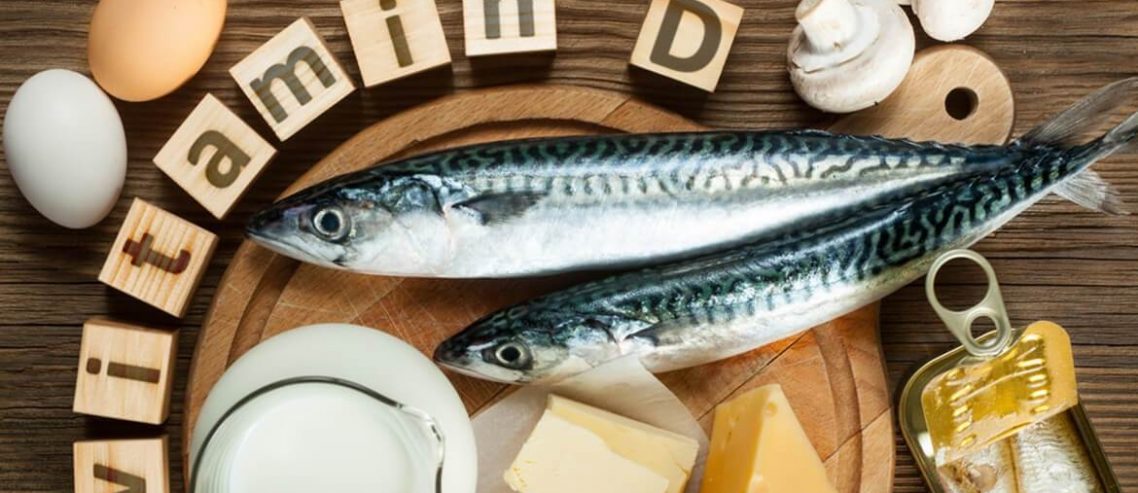

Comments
Leave a Comment